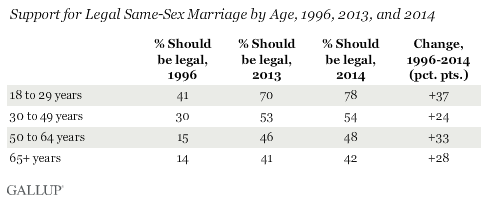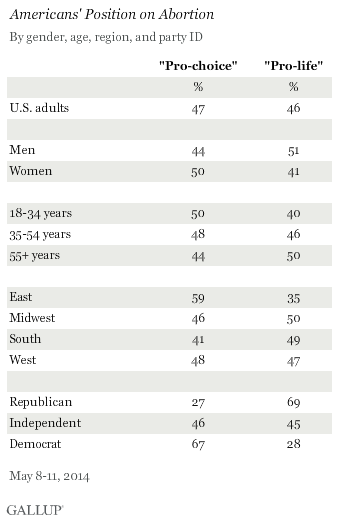( Note, I couldn't find a graphic from a 2014 poll for all of the examples below ( one is from 2010 ), but as the same-sex-marriage poll below indicates, it seems that the young-adult generation is getting more socially liberal as time goes by. )


Considering that the social policies supported by Millennials are generally supported by Democrats and opposed by Republicans ( Regarding the interracial marriage poll above: Clearly there is no official Democratic or Republican position on interracial marriage, and the vast majority of Republicans are in favor of it. However, the interracial marriage poll above does show that Republicans are roughly twice as likely to oppose interracial marriage than Democrats ), you might think that more Millennials voters would support Democratic candidates than Republican candidates. However, a Harvard University Institute of Politics poll released right before the 2014 midterm elections shows that this may not be the case.
I couldn't find a nice chart with the poll results, but the article reporting the poll states the following:
While more 18- to 29- year-olds (50%-43%) surveyed in the IOP’s fall 2014 poll would prefer that Congress be controlled by Democrats instead of Republicans, the numbers improve dramatically for the GOP when only young people who say they will “definitely vote” are studied. Among these likely voters, the IOP’s latest poll shows the preference shifting, with slightly more than half (51%) preferring a Republican-run Congress and 47 percent wanting Democrats to be in charge – a significant change from the IOP’s last midterm election poll in the fall of 2010 when Democratic control was preferred among likely voters 55 percent to 43 percent.
According to this poll, the members of the socially liberal Millennial generation are more likely to vote for Republicans than Democrats. So what's going on here?
Well, the first thing we need to consider is that this is only one poll. The 4% difference between Republican support and Democratic support is almost certainly within the margin of error, so if this poll was conducted again, it's quite possible that the poll might show the majority of Millennial voters support Democrats.
Second, and more importantly, the polls I cited at the top of this post are based on all Millennials, while the 51%-47% result that favors Republicans is based on Millennials who said they would "definitely vote". It has long been understood that highly motivated voters tends to vote Republican and unlikely voters tend to support Democrats ( Which incidentally, is why Republicans want to make people jump through all sorts of hoops in order to vote. )
Third, it seems that mainstream Republicans have won the Republican civil war against far-right Republicans and have made sure Republican candidates de-emphasized social issues in the 2014 campaign.
However, even with all those factors, it's still surprising that any poll showed so much Millennial support for Republicans, especially because the very same poll from 4 years ago showed Millennial likely voters favoring Democrats by a 55% to 43% margin. So, while I hate to rip-off Thomas Frank for the second time in two months, I have to ask ...
What's the matter with Millennials?
While Frank tried to explain why people from Kansas vote against their economic interests, I'd like to understand why a majority of Millennials may have just voted against their social interests.
Well, to comprehensively answer that question I would need the resources to do extensive polling of Millennials ( and perhaps even a time machines to poll likely Millennial voters in previous years ). Considering that I don't have those resources, and my Google searches for relevant polls has mostly come up empty, I have no choice to make a few educated guesses.
I'll start by pointing to to the results of two slightly relevant polls I was able to find ...
Article about AP-GfK poll ( Raw data for this poll can be found here ).
Article about NBC News/Wall Street Journal poll ( Raw data found here ).
These polls show that American voters care much more about economic issues these days than social issues. With that in mind, I think it's clear that Democrats made a big mistake in this election cycle any time they decided to focus on social issues rather then economic issues. Rather than running from President Obama's record, they should have been trumpeting how much the economy improved during the Obama administration.
Unfortunately, the results of the two polls above are not broken down by age, so I can't be sure that Millennials are focusing on economic issues rather social issues. However, considering the general trend in the polls and Millennials' positions on social issues, it seems clear that Millennial voters were focused more on economic issues. I would like to think the Democrats would be able to convince Millennials that Democrats have better economic policies than Republicans ( especially considering the economy was great under Clinton's watch, crashed under George W. Bush's watch, and has improved tremendously under Obama ), but Democrats are clearly having trouble selling their economic accomplishments to voters. When Democrats do a poor job selling their economic policies, voters will often gravitate to Republican candidates who promise to put more money in their pockets by lowering taxes.
However, even if we accept that Millennial voters are supporting Republicans for economic reasons, that still doesn't really explain their shift in support from 2010 to to 2014. After all, back in 2010, the economy was doing much worse than it is now. So, if economic issues were going to drive Millennial voters away from Democrats, you would think it would have happened to a greater extent in 2010 than in 2014. However, the polls show the complete opposite of that, so I'm not convinced that Millennial voters' support has shifted toward Republicans because Millennials care more about the economy now that they did in 2010. Instead, I think that their passion for Democratic candidates has decreased, because Millennials care less about social issues than they did in 2010.
I can't prove this without a polling firm and a time machine, but consider the following ...
- Back in 2010, Gay marriage was legal in 5 states; now it is legal in 35 states.
- Back in 2010 recreational marijuana use wasn't legal in any state; now it is legal in 4 states.
- Abortion has been legal for 41 years, and there hasn't been a serious Supreme Court challenge to Roe v. Wade since Planned Parenthood v. Casey back in 1992.
The truth is, while the culture wars certainly aren't over, during the lifespan of Millennials the Left has been winning the culture war in a rout - especially in recent years. I believe the recent success of the Left in the culture war may have made Millennials complacent about social issues. I don't think Millennial have any doubt that they'll one day live in a world in which gay marriage and recreational marijuana are legal in practically all states. I don't think socially liberal Millennials can conceive of a USA in which abortion isn't legal. While most Millennials disagree with with social policy positions of Republicans, I don't think they believe that Republican can actually put those policies into practice. Thus, if Republicans do a better job selling their economic policies than the Democrats do selling theirs, a lot of Millennials could be persuaded to vote Republican.
Democratic politicians and their liberal supporters should be proud of the work they've done moving the country to the left on social issues, but they shouldn't rely on social issues for their future electoral success. The Todd Akins, Richard Mourdocks, and Christine O'Donnells of the world helped the Democratics hold on to the Senate in 2010 and 2012, but you didn't hear nearly as many socially conservative Republican voices during the 2014 campaign. Considering how well things went for Republicans in 2014, I see no reason why this Republican trend of de-emphasizing social issues won't continue.
I'm sure it won't happen in 2016 or 2020, but I'm convinced that Republicans will nominate a pro-Gay Marriage presidential candidate within a generation. As women continue to gain power in society ( American women are far more likely to earn a college degree than American men these days. Men still hold the bulk of institutional power that makes sex discrimination possible, but that will surely erode over time considering that the average college-aged women is far better equipped to contribute to society than the average college-aged man. ), sex discrimination against women will decrease, and women may have less motivation to vote for Democrats on the basis of women's rights issues. Considering that whites will no longer be the majority race in the USA within a generation ( The Census Bureau predicts this will happen by 2043, and it is already the case that the majority of people being born in the USA are non-white. ), Democratic policies to fight racial discrimination will become less relevant to people over time.
The bottom line is that Liberal Democrats are victims of their own success. It won't be long before Democrats will no longer be able to rely on the social issues that have brought them so much electoral success in the past. If Democrats want to compete with Republicans going forward, they need to make a better case that their economic policies and tax policies are better for Americans than the policies of the Republican party. They need to make a case that they can employ the nation's military might more wisely than Republicans. They need to make the case that they care about the average American, while Republicans primarily care about the rich and powerful. In short, the Democrats need a few hundred more Elizabeth Warrens.
Unfortunately for Liberals like myself, it seems that Democrats only have one Elizabeth Warren in the spotlight, but I'm hoping that if we see a lot more of her in 2016, a lot more potential Elizabeth Warrens will be inspired to step out onto the political stage.
Rich




No comments:
Post a Comment
I've enabled comment moderation to make sure I don't miss any comments on old posts. I'll pretty much approve any comment you'd like to make ( Go ahead, try me! Be as outrageous as you'd like! ).